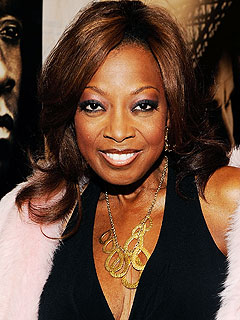A stronger union
On Black Marriage Day, couples renew vows and activists urge more Texans to commit
James Nielsen Chronicle
Renae and Keith Brown, in foreground, and Kym and Cecil Snow show their love.
Black Marriage Day: Started in 2003 in response to low rates of black marriage; Created by journalist Nisa Muhammad, executive director of the Washington-based Wedded Bliss Foundation. Over the years, marriage activists in hundreds of cities have heralded the benefits of marriage, celebrated successful unions and promoted matrimony. The national observance is Sunday. Muhammad's efforts were featured on CNN's Black in America 2 documentary.
Cocooned among dozens of other married black couples, Racquel McKee stood beside her husband arms wrapped around his waist and eyes trained lovingly on his face as he explained why their marriage has lasted 10 years.
In all of the struggles I've been through, she's always been there, said Marcel McKee, 40. It's truly been a blessing.
The parents of three boys vow that they're together for the long haul.
I had an example of what marriage was what marriage should be with my grandparents, McKee continued. That's how I always saw my marriage something that's until death do us part.
A strikingly high 42 percent of black adults have never been married, compared with just 26 percent of all American adults.
The McKees were among 50 couples attending Celebrate Marriage Weekend on Saturday, organized by the Married Couples' Ministry at Windsor Village United Methodist Church to coincide with Black Marriage Day Houston.
Since 2003, the national observance has been a time for couples to renew their vows and for marriage activists to shepherd more black people to wedded unions. A wellspring of exuberance called The Obama Effect emerged recently as President Barack Obama and first lady Michelle Obama became icons of contemporary and enduring black matrimony.
Troubling statistics
A Barack and Michelle Obama partnership is hardly the relationship reality for most black Americans.
The difference is most distinct for Americans in their early 30s. By that age, half of blacks have never married, compared with 31 percent or lower for other groups.
According to 2009 U.S. Census Bureau reports, black females ages 35 to 44 are the only American women in their child-bearing years with lower marriage rates than men of the same race or ethnicity. By their early 40s, 31 percent of black women have never been wives, whereas 9 percent of white women, 11 percent of Asian women and 12 percent of Hispanic women have never been married.
The outlook for the traditional family is also bleaker for black Texans, who have the state's highest divorce and out-of-wedlock birth rates, according to U.S. Department of Health and Human Services figures.
So why aren't black people getting or staying married?
Marriage advocates and relationship researchers in the Houston area say the answer has multiple layers.
African-Americans are on the forefront of an overall retreat from marriage, said Holly Heard, a Rice University sociology professor, who noted that income and education are highly predictive factors of matrimony. African-Americans are more likely to be poor and less likely to have a college degree. There's also some concern about [gender] ratios and fewer marriageable black men.
Kenyatta Phelps, a Prairie View A&M University sociologist who studies dating among black adolescents, said there's not enough research to fully explain declining marriage rates among black Americans. She cites several potential reasons: delayed marriage for all groups that's more stark among black adults, more homosexual relationships and high rates of black male imprisonment.
She notes that woman far outnumber men at her rural, historically black university. In her social psychology research, she has found that black children have different socialization experiences and receive different cultural messages.
A lot of African-American females are taught independence and independence from men until they have achieved success. African-American males are told success goes hand in hand with dating at least those are the messages they are hearing. Data shows that white females are told success and family go hand in hand and success may take a backseat to family, said Phelps, a single black woman in her mid-30s. I personally think it's a coping mechanism. African-American women are delving into opportunities for success to deal with not having a partner.
Federal initiative
Following the lead of states, the federal government began the Healthy Marriage Initiative in 2002 to strengthen wedded unions and the decrease the likelihood of hardship experienced by children raised by single parents.
Marriage is one of the most natural joinings of the human spirit that has ever been recognized on the Earth, said Rev. W.S. Lee, a leader of Houston's African-American Healthy Marriage Initiative.
I've heard a lot of young people say: I don't want my adult life to be filled with the kind of pain and difficulty that I've seen in my family,' so they shy away from that commitment, Lee said. He and his wife of 43 years, Wilma, serve as marriage coaches with the group, an advisory committee to the Greater Houston Healthy Marriage Initiative. We want people to make the decision with confidence because they know they have the skills that can help them form a healthy relationship that leads to marriage.
In 2005, black Texans had a divorce rate 21.9 percent nearly double the rate for Hispanics, 11.4 percent. Sixteen percent of Anglos were divorced. In Texas and nationwide, two-thirds of black children are born to unmarried mothers. Nearly half of all Hispanic mothers are not married when they deliver, compared with one in four white Texas mothers, according to the National Center for Health Statistics.
Impoverished children
And in Texas, marriage doesn't insulate children from poverty. In 2006, half of the state's 3 million children from low-income families 1.5 million lived with married parents in urban areas like Houston, according to the American Community Survey. Most of the state's impoverished black children, however, lived with a single parent and one-third of those adults had never married.
But on Saturday at Windsor Village's Kingdom Builders' Center, those attending the marriage retreat wore T-Shirts declaring I love my husband and I love my wife.
After the McKees shared their story, Bill Ashley said the goal wasn't just staying together, but experiencing lasting, happy marriages.
You have to invest in time with your spouse. Long after your children are gone, you are going to be with your spouse, Ashley, who has been married for 39 years, said to rousing applause. For those of you who have children, I encourage you: Spend some time with your spouse alone.


















































































